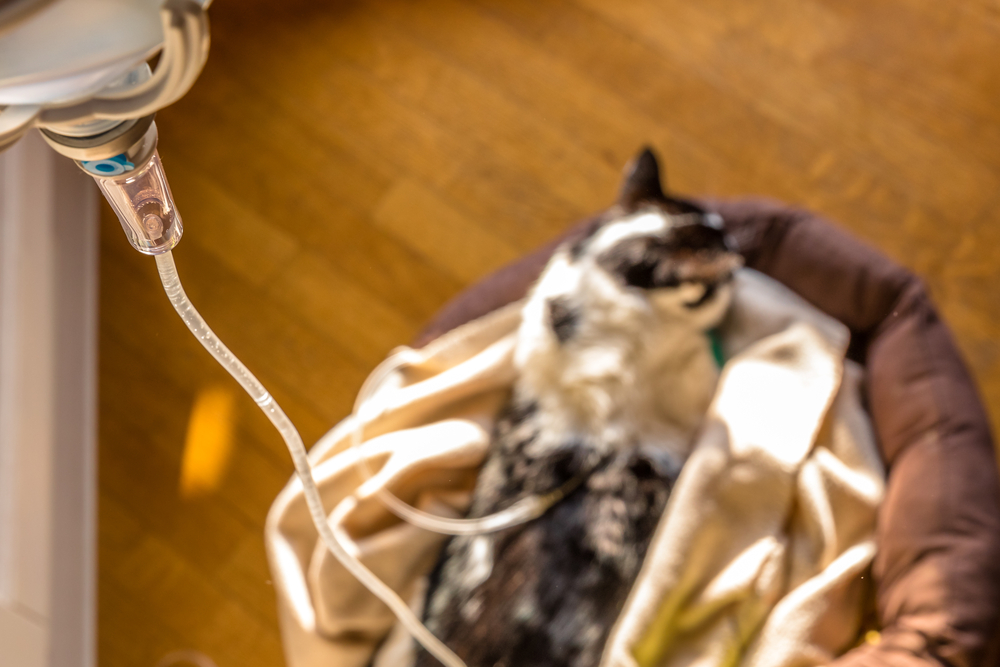Two big chocolate-indulging holidays are approaching, and you likely will have lots of this sweet, sugary, melt-in-your-mouth treat in your home. Most people and pets find chocolate irresistible, but chocolate affects people and pets differently—people can metabolize chocolate’s components, but chocolate in all forms is dangerous for pets. Learn all about chocolate toxicity in pets.
Why is chocolate toxic to pets?
Chocolate contains chemical compounds called methylxanthines, specifically theobromine and caffeine. Theobromine is more toxic, but caffeine is ultimately converted into theobromine. Pets are far more sensitive to the effects of these compounds because, unlike people, they cannot metabolize them readily. So, the methylxanthines accumulate in the pet’s body and can cause potentially life-threatening problems in the cardiovascular and central nervous systems.
How much chocolate is toxic for my pet?
When it comes to chocolate, the darker the candy, the more dangerous it is for your pet. Chocolate that has a high cocoa content, such as dark chocolate and baking chocolate, has a much higher methylxanthine content than milk chocolate. In general, one ounce of milk chocolate per pound of body weight is a potentially lethal dose in dogs.
If you know the amount and type of chocolate your pet ate, you can use a chocolate toxicity calculator to determine if your furry pal needs emergency veterinary care. You can also contact an animal poison control hotline or our Livingston Animal Hospital team for advice.
What are the signs that my pet has chocolate toxicity?
Caffeine is absorbed 30 to 120 minutes after ingestion, so pets can show toxicity signs in 60 minutes, although signs most commonly appear 6 to 12 hours after ingestion.
Chocolate toxicity signs in pets can include:
- Agitation
- Excessive thirst and urination
- Vomiting
- Diarrhea
- Stomach bloating
- Hyperactivity
- Ataxia
- Tremors
- Seizures
- Heart rate and rhythm changes
- Increased respiratory rate
- Fever
- Blue or purple gums and tongue
Death also may occur, generally as a result of a cardiac arrhythmia, hyperthermia, or respiratory failure.
Is chocolate toxic to cats?
Yes, chocolate is also toxic to cats, but cats generally are much more discerning about their treats and prefer meat-based snacks. Cats rarely eat enough chocolate—especially dark or baking varieties—to cause toxicity. However, if your cat does eat chocolate, a much lower amount can cause toxicity than in dogs, because cats are more susceptible to methylxanthines.
What other problems can chocolate cause in pets?
Chocolate ingestion typically leads to vomiting and diarrhea, but can also cause another serious problem—pancreatitis. Chocolate’s high fat content can trigger pancreatic inflammation, in which digestive enzymes begin to consume the pancreas, and can be life-threatening.
If your pet develops pancreatitis from eating chocolate, you may notice:
- Lethargy
- Abdominal pain
- Vomiting
- Dehydration
- Decreased or no appetite
Mild and moderate pancreatitis cases generally have a good prognosis, but immediate treatment and the necessary supportive nursing care are critical to combat the disease.
Raisin and xylitol toxicity are also potential problems. If your pet chows down on a bag of chocolate-covered raisins, they are at risk for acute kidney failure. If they eat sugar-free chocolate sweetened with xylitol, the xylitol can lead to a sudden, severe drop in blood sugar and liver failure.
How is chocolate toxicity treated in pets?

Chocolate toxicity treatment depends on the amount and type of product ingested. Treatment started immediately may involve only decontamination, which consists of inducing vomiting and administering activated charcoal, followed by more charcoal treatments, if necessary. Theobromine can linger in the body for a long time and be reabsorbed through the bladder, so the subsequent treatments ensure binding of the toxin. Intravenous (IV) fluid therapy and frequent walks to encourage urination may also be necessary to speed up theobromine elimination. If your pet is vomiting, or has anxiety, arrhythmias, or seizures, they will need medication.
If you suspect your pet ate chocolate, contact an animal poison control hotline immediately. Then, give our Livingston Veterinary Hospital team a call and we will help you carry out the veterinary toxicologist’s treatment recommendations.







Leave A Comment